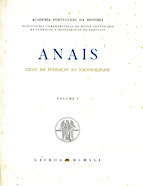

................................
Other notable studies in this series seek to introduce thematic diversity. For instance, História e municipalidade - novos conspectos [History and Municipality - New Perspectives] by Alexandre de Lucena e Vale (1966) explores the relationship between Portuguese local and central authorities over the centuries, building on the work of A. Herculano. Admiral Gago Coutinho presents studies on Vasco da Gama's first voyage to India and the first Atlantic crossings (1949), while Joaquim Bensaúde (1946) and Eduardo do Couto Lupi (1949) focus on the figure of King João II, with Lupi examining the monarch’s relationship with Christopher Columbus. Among others, these examples are sufficient to illustrate the analytical breadth of the scholars involved.
In summary, both series of the Anais exhibit both divergent and convergent characteristics. Each series received state sponsorship for the preparation of its works, and, along with the prevailing ideology of the time, this resulted in a nationalist slant, evident in the choice of themes and the terminology used. Although the first series was more focused on the double centenary of Portuguese nationality (and thus more limited in scope), it also aimed to celebrate the History of Portugal in alignment with the political climate of the era. The second series emerged in the post-war context and extended beyond the Estado Novo period, with a wider range of topics unrelated to the anniversaries commemorated in the first series. This broadened the focus to include medievalist themes, among others.
Following the regime change in 1974, historiographical changes that had already been noticeable before this socio-political shift were further emphasised and gradually consolidated during the transitional period. In fact, there was a partial break from the Estado Novo -era historiography, with a shift toward a broader range of historical themes— economic, social, fiduciary, artistic, linguistic, religious, and more— without abandoning political and military history altogether. This departure moved away from the nationalist perspective characteristic of the previous regime. Previously neglected or under-explored topics were now approached with a reformist, multidisciplinary, and more critical spirit. This allowed for a more interconnected understanding of historical phenomena and encouraged a review of earlier studies from new perspectives and analytical frameworks, especially with the arrival of new researchers at the Academy.
This work is financed by national funds through FCT - Foundation for Science and Technology, I.P, in the scope of the projects UIDB/04311/2020 and UIDP/04311/2020.
